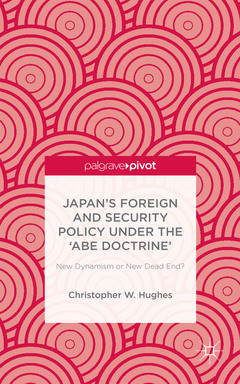Description
Japan's Foreign and Security Policy Under the ‘Abe Doctrine', 2015
New Dynamism or New Dead End?
Author: Hughes C.
Language: English
Subject for Japan's Foreign and Security Policy Under the ‘Abe...:
Approximative price 58.01 €
In Print (Delivery period: 15 days).
Add to cartSupport: Print on demand
Description
/li>Contents
/li>Biography
/li>
Christopher W. Hughes is Professor of International Politics and Japanese Studies, University of Warwick, UK. He has held visiting professorships at Harvard University, University of Tokyo, and Waseda University. He is the author of Japan's Remilitarisation (2009) and Japan's Reemergence as 'Normal' Military Power (2004).




